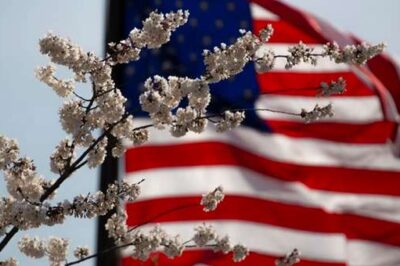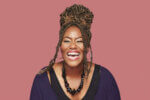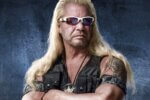America’s founding generation was a praying generation. Their belief in the power of prayer was both a present conviction and a tradition going back to the very first immigrants to this land. For example, the very first act of the Jamestown settlers on disembarking at Cape Henry, Virginia, in April of 1607, was to erect a seven-foot oak cross they had brought from England. They then gathered around the cross for a prayer service in which they dedicated the land of their new home to God.
Before the Pilgrims departed Holland in July 1620 for the New World, they set apart an entire day to pray and ask God’s blessing on their venture of faith. William Bradford said that after their pastor, John Robinson, brought an exhortation from Scripture, “The rest of the time was spent in pouring our prayers to the Lord with great fervency, mixed with abundance of tears” (Hyatt, Pilgrims and Patriots, 23-24).
In the New World, the Pilgrims, and the Puritans who followed them, met every challenge with prayer and would often set aside special days for prayer, fasting and thanksgiving. This prayer habit became a part of the cultural experience of New England and was practiced by succeeding generations. This prayer practice found its way into American culture and its influence can still be seen and felt today, although there are stringent efforts to remove it.
A Great Prayer Awakening
After a time of spiritual decline in the late 1600s, a Great Awakening, beginning in 1726, profoundly impacted the Colonies and restored the spirit and culture of prayer to the populace. In his Autobiography, Benjamin Franklin tells of the change that came over his hometown of Philadelphia when George Whitefield preached there in 1739. He wrote,
The multitudes of all sects and denominations that attended his sermons were enormous, and it was a matter of speculation to me, who was one of the number, to observe the extraordinary influence of his oratory on his hearers. From being thoughtless or indifferent about religion, it seemed as if all the world were growing religious so that one could not walk through the town in an evening without hearing psalms sung in different families of every street (Hyatt, 102).
Similar reports emerged from Georgia to New England of entire communities being transformed by the Awakening. A spirit of prayer seemed to be unleashed throughout Colonial America. In New England, Jonathan Edwards, pastor of the Congregational Church in Northampton, Massachusetts, reported that “the entire town seemed to full of the presence of God.” Prayer could be heard, not just at church, but in homes and everywhere one went in the town.
The First Continental Congress Begins with Fervent Prayer
It is, therefore, no great surprise that the First Continental Congress, that met for the first time on September 5, 1774, opened with Bible reading and prayer. With British troops occupying Boston and having closed the Boston port, this was no formal prayer ritual, but a sincere lifting of their hearts to God, asking for His assistance and intervention in their fight for liberty.
The delegates asked an elderly, grey-haired Anglican minister, Jacob Dusche, to lead them in prayer. Dusche began by reading the entire 35th Psalm, which powerfully impacted everyone present. It is a prayer of David for deliverance and begins with the words, “Plead my cause, O Lord, with my adversaries; fight those who fight me.” The psalm ends with praise for God’s deliverance.
As the psalm was read, a unique sense of God’s presence filled the room and tears flowed from many eyes. John Adams wrote to his wife, Abigail, of the impact of the Bible reading and prayer on the delegates. He wrote,
Who can realize the emotions with which they turned imploringly to heaven for divine interposition and aid. It was enough to melt a heart of stone. I never saw a greater effect upon an audience. It seems as if heaven had ordained that Psalm to be read that day. I saw tears gush into the eyes of the old, grave pacific Quakers of Philadelphia. I must beg you to read that Psalm (Hyatt, 122).
After reading the psalm, Dusche began praying for the delegates, for America and especially for the city of Boston and its inhabitants who were under siege. As he began praying, the Anglicans, such as George Washington and Richard Henry Lee, knelt in prayer, according to their custom. The Puritans, according to their custom, sat with bowed heads and prayed. Others prayed according to their own unique customs. But although their outward manners differed, there was a singleness of heart and purpose as they all united in fervent prayer for God’s assistance and intervention for America.
The Congress and the Nation Pray
Prayer continued to be a daily part of the proceedings of the Continental Congresses. When, years later, Benjamin Franklin called the delegates of the Constitutional Convention to prayer, he reminded them, “In the beginning of the contest with Great Britain, when we were sensible to danger, we had daily prayers in this room for Divine protection” (Hyatt, 144).
In addition to the daily prayers, the Congress issued no less than 15 separate calls for special days of prayer and fasting during the Revolutionary War. For example, during the fall of 1776, when the morale of the army and populace had sunk to an all-time low because of a poor harvest and hardship on the battlefield, Congress proclaimed December 11, 1776, as a Day of Fasting and Repentance.
John Witherspoon, a Presbyterian Reformer and member of the Congress, was deputized to write the proclamation, which was then approved by the rest of the Congress. It reads, in part,
WHEREAS, the war in which the United States are engaged with Great Britain, has not only been prolonged, but is likely to be carried to the greatest extremity; and whence it becomes all public bodies, as well as private persons, to reverence the Providence of God, and look up to him as the supreme disposer of all events, and the arbiter of the fate of nations; therefore; RESOLVED, That it be recommended to all the United States, as soon as possible, to appoint a day of solemn fasting and humiliation; to implore of Almighty God the forgiveness of the many sins prevailing among all ranks, and to beg the assistance of his Providence in the prosecution of the present just and necessary war (Hyatt, 123-24).
There was an amazing change of circumstances after this and succeeding days of prayer, with successes on the battlefield and the reaping of abundant harvests. There was, in fact, such a turnaround that in 1779 Congress issued a proclamation setting aside a day of thanksgiving, because “it hath pleased Almighty God, the father of mercies, remarkably to assist and support the United States of America in their important struggle for liberty.”
The Congress then listed seven different accomplishments of God on the behalf of the nation, including “many instances of prowess and success in our armies” and “so great abundance of the fruits of the earth of every kind, as not only to enable us to easily to supply the wants of the army, but gives comfort and happiness to the whole people” (Hyatt, 124).
Yes, the founding generation saw answers to their prayers. Indeed, when Franklin called the Constitutional Convention to prayer in 1787, he not only reminded them of the daily prayer during the war, but also that the prayers were answered. Addressing the convention president, George Washington, he said, “Our prayers, sir, were heard and they were graciously answered” (Hyatt, 144).
Washington Makes Prayer a Daily Routine for the Colonial Army
The Second Continental Congress, which convened on May 10, 1775, asked George Washington to become commander-in-chief of the ragtag Colonial militias and to transform them into an army that could face the mighty British war machine. Washington accepted the call and began immediately to instill in the colonial troops a very real faith in God, for as the Catholic scholar, William Novak, says,
Washington knew his only hope lay in a profound conviction in the hearts and daily actions of all his men that what they did they did for God, and under God’s protection (Hyatt, 128).
Washington, therefore, issued an order that each day was to begin with prayer led by the officers of each unit. He also ordered that, unless their duties required them to be elsewhere, every soldier was to observe, “a punctual attendance of Divine services, to implore the blessing of heaven upon the means used for our safety and public defense.”
Washington also issued an order forbidding profanity and drunkenness; and in a general letter to his troops, he said, “The General hopes and trusts that every officer and man will endeavor to live and act as becomes a Christian soldier.”
That Washington himself was a devout person of prayer was confirmed by Isaac Potts, a Quaker who lived near Valley Forge, Pennsylvania, when the Continental Army, led by Washington, was wintering there under much duress in 1777-78. Potts was a pacifist who opposed the war until he had a life-changing experience while riding through the woods one day during, perhaps, the bleakest period of the war. He said,
I heard a plaintive sound as of a man at prayer. I tied my horse to a sapling and went quietly into the woods and to my astonishment I saw the great George Washington on his knees alone, with his sword on one side and his cocked hat on the other. He was at Prayer to the God of the Armies, beseeching to interpose with his Divine aid, as it was ye Crisis, and the cause of the country, of humanity and of the world. Such a prayer I never heard from the lips of man. I left him alone praying. I went home and told my wife I saw a sight and heard today what I never saw or heard before, and just related to her what I had seen and heard and observed. We never thought a man could be a soldier and a Christian, but if there is one in the world, it is Washington (Hyatt, 129).
Washington’s Earnest Prayer for America
The many prayers were heard and the unthinkable happened: The American colonists defeated the mighty British army. The war officially ended on October 19, 1781 when General Cornwallis surrendered his entire force to Washington. In customary fashion, Cornwallis turned his sword over to Washington, and the weaponry of his troops was stacked in neat piles. As this occurred the British band played, “The World Turned Upside Down.” For freedom-loving people everywhere, however, the world had been turned right side up.
Having completed his call, Washington issued a letter of resignation as commander in chief to the Continental Congress. Then, he wrote what could be described as a pastoral letter, dated June 14, 1783, to the governors of the various states. This letter included his “earnest prayer” that is here quoted in part. He wrote,
I now make it my earnest prayer that God would have you, and the State over which you preside, in his holy protection; that he would incline the hearts of the citizens … to entertain a brotherly affection and love for one another … and to demean ourselves with that charity, humility, and pacific temper of mind, which were the characteristics of the Divine Author of our blessed religion, and without a humble imitation of His example in these things, we can never hope to be a happy nation (Hyatt, 129).
After being sworn in as president, George Washington issued a proclamation designating November 26, 1789, as a Day of Thanksgiving and Prayer. The proclamation assumes the obligation of all citizens to honor God and to pray for His protection and favor. It opened with the following statement.
Whereas it is the duty of all Nations to acknowledge the providence of Almighty God, to obey his will, to be grateful for his benefits, and humbly to implore his protection and favor, and whereas both Houses of Congress have by their joint Committee requested me to recommend to the People of the United States a day of public thanksgiving and prayer to be observed by acknowledging with grateful hearts the many signal favors of Almighty God.
Prayer is American
Yes, prayer played a vital role in the founding of America. Novak is correct when he says, “In all moments of imminent danger, as in the first Act of the First Continental Congress, the founding generation turned to prayer.”
Seeing the vital role of prayer in the founding of this nation, let us not be intimidated by the assertion that prayer is somehow inappropriate for public or political venues. Let us be bold in our faith. Let us be salt and light in this generation. Let us pray. It is the godly thing to do. It is the American thing to do! {eoa}
This article is derived from the book Pilgrims and Patriots by Dr. Eddie L. Hyatt, available from Amazon and his website at eddiehyatt.com/bookstore.html. To read about Eddie’s passion and vision for another Great Awakening, visit his website at eddiehyatt.com.







Leave a Comment
You must be logged in to post a comment.